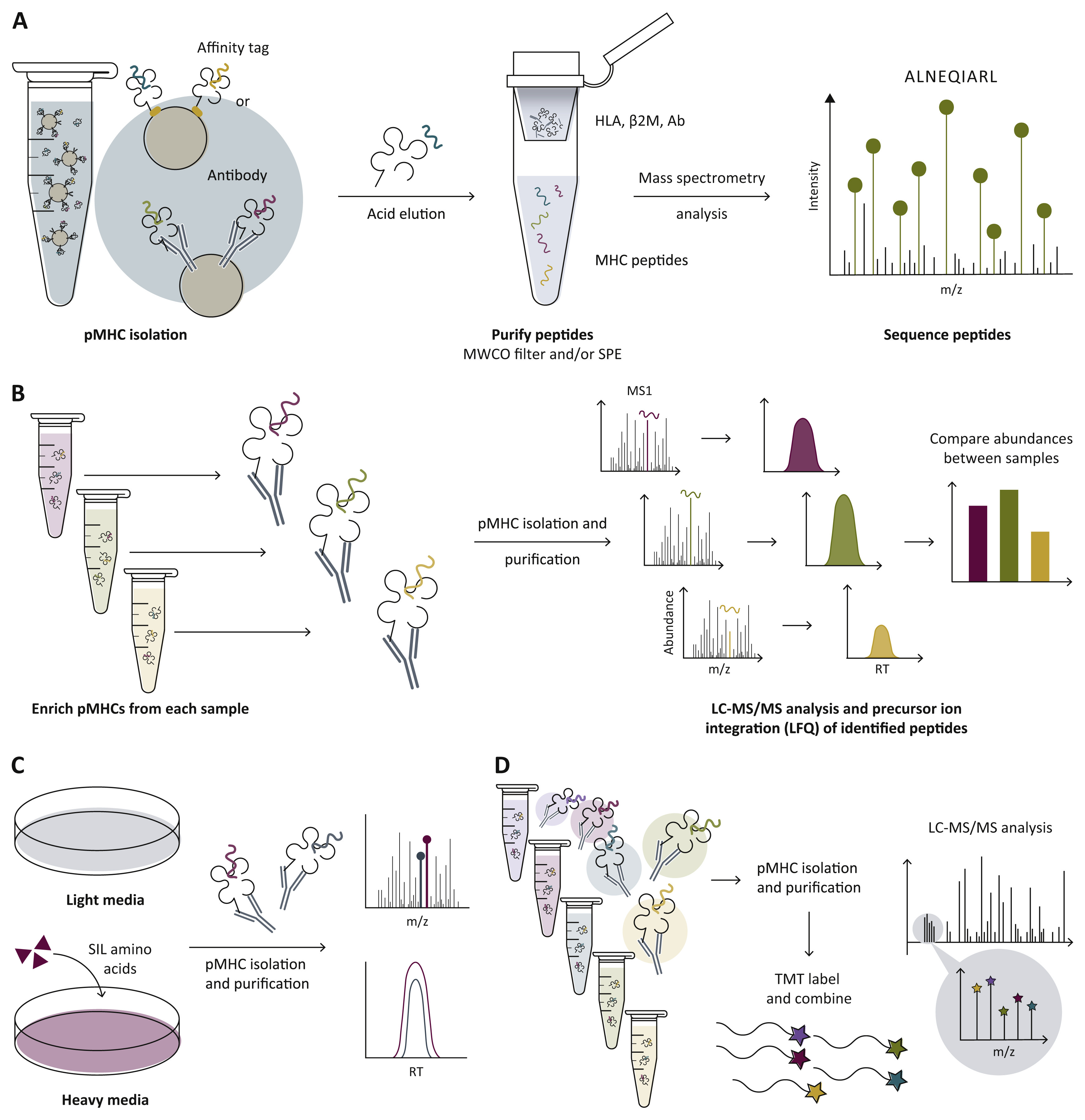MHC-binding Peptides Identification Service
MHC-binding peptide identification analysis is a method that uses mass spectrometry to systematically identify and quantify peptides bound to major histocompatibility complex (MHC) molecules. This technique enriches MHC-bound peptides through immunoaffinity purification and performs precise identification and quantification of the peptides using liquid chromatography-tandem mass spectrometry (LC-MS/MS). This process helps reveal the characteristics of antigen presentation in the immune system and provides insights into immune recognition mechanisms.
MHC-binding peptides identification service is widely applied in tumor immunology, vaccine development, and immune evasion mechanism research. By systematically analyzing peptides bound to MHC molecules, researchers can discover new antigens, identify T cell epitopes, promote the development of personalized immunotherapy strategies and tumor immunotherapies, and provide essential data support for vaccine epitope screening.
Services at MtoZ Biolabs
Based on high-resolution mass spectrometry platforms, MtoZ Biolabs offers the MHC-binding peptides identification service focusing on identifying and quantifying endogenous peptides bound to MHC molecules. This service enriches MHC-bound peptides through immunoaffinity purification and performs precise analysis using LC-MS/MS. Clients can obtain peptide sequence information, abundance distribution, modification states, and other data, supporting research in antigen presentation, tumor immunology, vaccine epitope screening, and other immune-related fields. MtoZ Biolabs provides services that include but are not limited to the following:
1. Peptide-MHC Binding Affinity Prediction
Using computational methods to predict the binding affinity between peptides and MHC molecules, helping to identify potential immune epitopes and evaluate their presentation ability.
2. Epitope Mapping
Constructing binding maps of specific peptides in different MHC contexts, providing data support for immune response analysis and assisting in vaccine and immunotherapy design.
3. T Cell Epitope Prediction
Predicting T cell-recognizable epitopes based on the presentation characteristics of MHC-bound peptides, aiding in the identification of key peptides involved in immune responses.
4. High-Throughput Screening
Using high-throughput methods to rapidly screen multiple peptides for binding affinity and immunogenicity with MHC molecules, supporting large-scale immunology research.
5. Bioinformatics Analysis
Analyzing the structure, immunogenicity, modification status, and other characteristics of peptides, combined with big data algorithms, to reveal their potential functions and roles in immune responses.
Analysis Workflow
1. MHC Peptide Enrichment
Peptides bound to MHC molecules are enriched using immunoaffinity purification techniques, ensuring high specificity and purity of the peptides.
2. Mass Spectrometry Analysis (LC-MS/MS)
High-resolution mass spectrometry platforms are used to analyze the enriched MHC-bound peptides through liquid chromatography-tandem mass spectrometry, obtaining mass-to-charge ratio (m/z) information and abundance data for the peptides.
3. Peptide Sequence Analysis
Based on mass spectrometry data, peptides are sequenced using database searches or de novo algorithms, identifying their source antigens and potential functional information.
4. Immune Function Analysis and Epitope Prediction
Combining MHC typing with mass spectrometry data, T-cell epitope prediction and immunogenicity analysis are performed to provide data support for immune-related research and target discovery.

Stopfer, L E. et al. Immuno-Oncology and Technology, 2021.
Figure 1. Schematics of Immunopeptidomics Workflows for Standard Discovery-Based Peptide-MHC Identifications.
Sample Submission Suggestions
1. Sample Quantity and Purity
Each sample should be provided in sufficient quantity to ensure there are enough peptides for analysis. The sample must have a purity greater than 95%.
2. Sample Storage and Transport
Samples should be stored at -20°C or lower and transported with dry ice to prevent degradation. Repeated freeze-thaw cycles should be avoided to maintain peptide integrity.
3. Additional Information
Please provide sample preprocessing information and relevant typing data (if available) to help optimize peptide enrichment and analysis parameters.
Service Advantages
1. High-Resolution Mass Spectrometry Platform
Based on advanced mass spectrometers such as Orbitrap, this service can accurately identify and quantify low-abundance MHC-bound peptides, ensuring high-quality and reliable data.
2. Comprehensive Functional Analysis
Provides both qualitative and quantitative peptide data, combined with T-cell epitope prediction and immunogenicity assessment, aiding in immune mechanism research and target discovery.
3. High-Throughput Screening Capability
Uses high-throughput methods to simultaneously screen multiple peptides, significantly improving data collection efficiency and expanding the scope of research.
4. One-Stop Service Workflow
Offers a complete service flow from sample preparation, peptide enrichment, mass spectrometry analysis to data interpretation, streamlining experimental operations and enhancing analysis efficiency.
Applications
1. Tumor Immunology Research
MHC-binding peptides identification service can be used to analyze peptides bound to MHC molecules in tumor cells, identifying potential tumor neoantigens and providing data support for further research.
2. Vaccine Development
By screening immune peptides with high binding affinity to MHC molecules, this service aids in designing more immunogenic vaccine epitopes, enhancing the efficacy of vaccines.
3. Immune Epitope Screening
MHC-binding peptides identification service can be used to identify and screen T-cell recognizable immune epitopes, supporting immune response research and the development of personalized immunotherapy strategies.
4. Immune Monitoring and Functional Research
By analyzing peptides in the immune system, this service helps reveal key factors in immune responses, supporting immune monitoring and immune mechanism studies.
FAQ
Q1: Can Different Types of MHC Molecules Be Analyzed?
A1: Yes, we can analyze different types of MHC molecules, including MHC class I and class II molecules. By enriching MHC-bound peptides of specific types, we can provide both qualitative and quantitative analysis tailored to different research needs.
Q2: Can Post-Translationally Modified Peptides Be Analyzed?
A2: Yes, we support the identification and analysis of post-translationally modified peptides, including phosphorylation, acetylation, and more. If you need to analyze modified peptides at specific sites, please contact us in advance. We will adjust the detection process and data analysis strategy according to your requirements.
Deliverables
1. Comprehensive Experimental Details
2. Materials, Instruments, and Methods
3. Data Analysis, Preprocessing, and Estimation
4. Bioinformatics Analysis
5. Raw Data Files
How to order?







